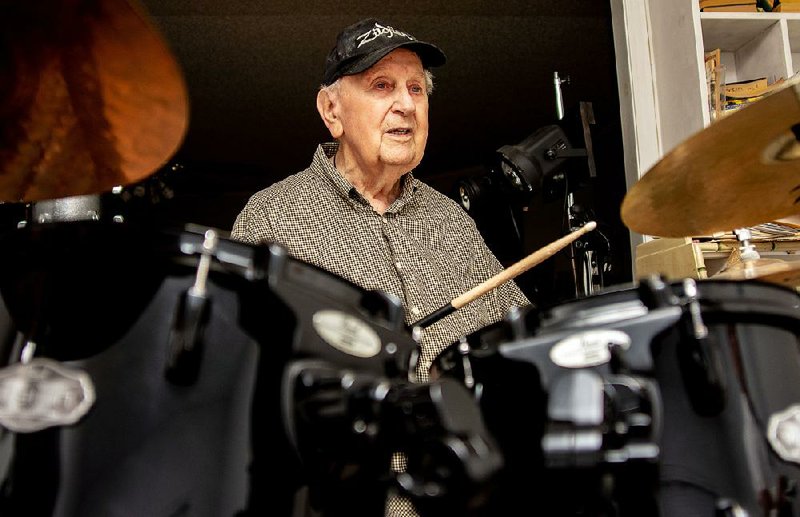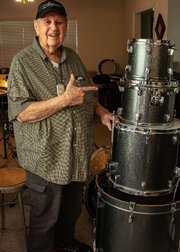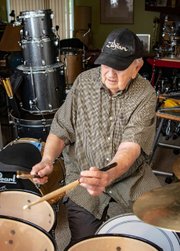When he was 7 or 8, Joe Holland went to a parade in his hometown of Shreveport.
His life was never the same.
"The high school bands came by and they were playing drum marches. I mean, it hit me where I lived. I said, 'I have got to find out how you do that.' It never left me."
Holland is 90 now and sits behind a drum kit on the last day of July in his west Little Rock home.
"This is what I heard at that parade," the grandfather of four says, then plays the patterns of a march on the kit. "I was electrified. I'm electrified again."
Holland's home is a testament to his passion for the drums. Much of the space is taken up by drum sets, drum stands, high hats, cymbal stands, tom-toms, brushes, sticks, cymbals and other drumming accessories. Recalling his life and adventures, he is somehow almost boyish in his black baseball cap advertising Zildjian cymbals.
TEEN DRUMMER
Holland's father was a builder who also liked to drink.
"I would get on the trolley and go find him in the bars. I was 6- 7- 8-years old," Holland remembers. "I knew the bars he liked and would say, 'Daddy, we have to go home.' It was a sad picture."
His mother was also a drinker, and when Holland's older brother and sister left home, he was left mostly to fend for himself.
By the time he was 13, Holland was hanging around Broyles' Music Store and at the Musicians' Union at Shreveport's Inn Hotel.
"There was a drum set up in the basement of the Inn Hotel and you could play on it," he says. "I would go down there and some guy would come in with his horn and say, 'Let's play, and I'll show you what you need to do on drums.' I began to learn that this was what these guys needed."
It was the beginning of Holland's reverence for a style of drumming that is respectful of basic rudiments and that properly serves the song.
"You don't sit behind the drums and bang on everything," he says. "A lot of guys think that's what you do, but you have to [know fundamentals]."
Holland soon teamed up with brothers Hoke and Paul Rice.
"Paul played bass and Hoke played guitar," he says. "I'd have a drum set up and they would say here's what we would like you to do. And this was country music, which had never used a drum before. I was one of the first drummers to get into country music."
Paul Rice wrote "You Are My Sunshine," but sold the rights to Jimmie Davis, the Louisiana governor who would go on to have a huge hit with the song.
"He ended up making several million dollars from that song," Holland says, while Paul got nothing.
Holland and the Rice brothers were joined by Mississippi-born guitar wiz Snoozer Quinn.
"Among musicians, he was one of the most famous," Holland says. "He played with the Paul Whiteman Orchestra in New York. Very unique guy. I never met anyone even close to Snoozer Quinn."
CASHING IN
Still just 13, Holland began working with bandleader Bill Roland, playing at the "the worst joint you could imagine" on Cross Lake near Shreveport.
"I was 13 and playing in a whorehouse," he says, laughing. "You would think it would be a terrible influence on a boy, but I was smart. I knew what all those girls were there for, and what the guys where there for. It didn't bother me."
He was also making bank.
"Every Saturday night, Bill Roland handed me a $100 bill. There were people raising families who had never seen a $100 bill, and I had a pocket full of them."
With his roll of hundreds, he bought a maroon Packard for $300 from a man about to join the service.
"My dad came home and said, 'Whose car is that?' and I said, 'Mine.' And he said 'Where's the title?' And I said, 'What's a title?'" Holland says with a laugh.
OL' BLUE EYES
The industrious young Holland had also gotten a spot in the Centenary College band when its drummer was leaving for the service and split his time between playing for them and Roland.
When he was 14, he went with some friends to Mattie's Palm Isle, a nightclub in Longview, Texas, to see Tommy Dorsey and Frank Sinatra.
Standing around watching Dorsey's drummer, Buddy Rich, set up, Holland was joined by Sinatra.
"He was really pale," Holland says. "He looked terrible, and I thought, 'This is what all the girls are going crazy for?'"
Sinatra was in an expansive mood before the show, and told Holland about his newborn daughter, Nancy.
He also introduced him to the bombastic Rich.
"I can honestly say that I was introduced to Buddy Rich by Frank Sinatra," Holland says, still a bit awestruck.
When Sinatra hit the stage, Holland and his friends saw firsthand the crooner's power.
"The dance floor was full of people and you could hardly move, but when Frank sang they would all stop," he says. "They were transfixed by that voice. They looked like they were caught in a picture. I nudged our piano player and said, 'Look at that.' Sinatra. That's what he did to people."
RUDE AWAKENING
Holland's unconventional lifestyle -- the car, girls constantly calling the house -- caused his mother to send him away.
He was still just 14 when he was enrolled at Gulf Coast Military Academy in Gulfport, Miss.
"It was the most horrible place," he says. "You can't imagine. You've seen movies, but the movies can't come close to how bad it was. It was torture."
Drumming kept him sane, he says: "They allowed me to bring my drum set. That literally saved my life."
He ended up in the hospital after a fight with another boy (who was also hospitalized, Holland says) and plotted his escape.
Soon after recovering from the fight, and with help from friends in Gulfport, he packed his drums and belongings and hopped on a bus for New Orleans.
"As I rode the bus over from Gulfport, I came up with a plan for myself," he says. "I will never smoke, never drink alcohol, and I'm not going to do anything to attract the attention of the police or the school board. I had it all in my mind how I would handle everything. It just started coming together."
He stored his things at the bus station and found the musicians union.
"The guy said, 'I'm glad to see you! Everybody's been drafted. Where do you want to play tonight?'"
FEATURING JOE HOLLAND ON DRUMS
Through connections from Shreveport, Holland got a room at the Roosevelt Hotel and eventually found a house to rent.
While in New Orleans, he drummed for entertainer Candy Candido, touring the country.
"He was a real star," Holland says.
He also played some shows with the Three Stooges at the St. Charles Theater in New Orleans in 1945.
"We did three shows a day for five days," he says. "When they got onstage, there would be pretend hitting, but mostly they would sing. They did wonderful three-part harmonies."
There was also a stretch, when he was 17 and was the only boy in an otherwise all-female outfit led by Mickey Stevens.
"They would say, 'And featuring Joe Holland on drums,' in advertisements to keep the all-female angle," Holland says.
When he was 18, Holland returned to Shreveport to finish high school, living on his own and playing clubs in the evening. He later entered Centenary College as a pre-med student and attended for four years, but didn't graduate.
He joined the Army and worked in the nuclear weapons program and also played in an Army band when he was stationed in Washington state.
In 1955, he married Little Rock native Nancy Roy and moved here. They were married 13 years and had one daughter, Catherine, before divorcing.
He worked outside of music as a salesman for Revlon and other companies. There was also an investment in a Mississippi-based pharmaceutical company that proved fruitful, he says, but he was never far from his drums.
He would sit in with Little Rock jazz legend Art Porter's band when its drummer, Larry Ross, couldn't play.
"It was no improvement to the band," Holland says of his contribution. "Larry was a great drummer. What that band did was mystifying. They should have been nationally known."
In the '70s and '80s, he led bands that played at Cajun's Wharf and the Afterthought.
Fellow Shreveport transplant and drummer Dave Hoffpauir befriended Holland in the early '90s.
"He's a jazzer," Hoffpauir says. "He can play straight ahead jazz or big band stuff."
Hoffpauir also tells of Holland's unique way to warm up before drumming.
"Drummers practice rudiments on a plastic practice pad or a snare drum because the stick bounces. Joe would play rudiments on a pillow," which is much more difficult, Hoffpauir says.
STILL PLAYING
Holland, whose favorite drummer is Steve Gadd, spends time perusing the used drum section at Guitar Center, looking to add to his collection or find items he can resell.
"He comes in all the time," says Guitar Center operations manager Jeff Morgan, who drums for heavy metal band Rwake. "I've seen him tap around and it's pretty cool to watch."
Morgan recalls Holland's story of being at the Los Alamos National Laboratory in New Mexico and seeing nuclear physicist Robert Oppenheimer.
"I was stunned," Morgan says. "Robert Oppenheimer, the father of the nuclear bomb."
Morgan couldn't resist asking Holland if he knew anything about aliens being kept and studied at the secretive Area 51 in New Mexico.
"It was just me and him, nobody else around, and he says 'Jeff, the people coming out of the universities at that time were so smart, we didn't need any aliens.' I was like, drop the mic, all of my Area 51 dreams are crushed," Morgan says, laughing.
Holland says he coaches some local drummers and has a grandson who plays. Holland even performs, though not so much lately.
Sitting behind the kit at his home, it's not hard to imagine the little boy who found his own happiness in the sound of a marching band's drum all those years ago.
"Whatever else I did, drums were there," he says. "I've done completely incredible things. But I would still go out and play drums. It got me away from my parents, got me in my own place, made me totally independent. It seems so simple, but it saved my life."
Style on 08/21/2018




